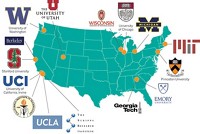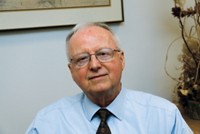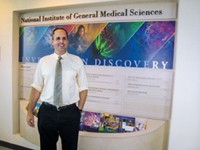Advertisement
Grab your lab coat. Let's get started
Welcome!
Welcome!
Create an account below to get 6 C&EN articles per month, receive newsletters and more - all free.
It seems this is your first time logging in online. Please enter the following information to continue.
As an ACS member you automatically get access to this site. All we need is few more details to create your reading experience.
Not you? Sign in with a different account.
Not you? Sign in with a different account.
ERROR 1
ERROR 1
ERROR 2
ERROR 2
ERROR 2
ERROR 2
ERROR 2
Password and Confirm password must match.
If you have an ACS member number, please enter it here so we can link this account to your membership. (optional)
ERROR 2
ACS values your privacy. By submitting your information, you are gaining access to C&EN and subscribing to our weekly newsletter. We use the information you provide to make your reading experience better, and we will never sell your data to third party members.
Careers
Movers And Shakers
John Schwab
An advocate for mentoring young organic chemists will retire from NIH this month
by Britt E. Erickson
May 30, 2011
| A version of this story appeared in
Volume 89, Issue 22

One of organic chemistry’s staunchest allies at the National Institutes of Health is leaving; finding a replacement with the same passion for organic chemistry could be difficult.
For the past 15 years, John M. Schwab has been overseeing extramural grants in organic synthesis, chemical biology, and natural products chemistry at NIH. Many people in the organic chemistry community consider him a hero for spearheading a mentoring workshop for junior faculty and for promoting organic chemistry as an integral component of biomedical research.
Schwab will retire on May 31 from his role as a program director at the National Institute of General Medical Sciences, the leading NIH institute for the support of chemical research. C&EN sat down with him earlier this month to talk about his work at NIGMS and how organic chemistry has changed over the past decade and a half.
Of all the aspects of his job, Schwab takes the most pride in mentoring young researchers. When he arrived at NIH in the mid-1990s, “the number of grants and grantees in organic chemistry was going down almost to zero,” he tells C&EN. The decline “correlated with the aging of the grantee population. You could see the number of young investigators steadily dropping toward zero,” he says.
That alarming trend led Schwab and Michael P. Doyle, a chemistry professor at the University of Maryland, College Park, to launch an annual NIGMS-supported mentoring workshop for junior faculty in organic chemistry and chemical biology. The first workshop was held in 2005.
One of the lessons young faculty learn at the workshop is how to sell a project to peer reviewers. Good communication skills are “very important and underappreciated,” Schwab says. The workshop also aims to enhance skills that are not typically taught to graduate students and postdocs, such as “knowing how to motivate and get the most out of your coworkers, navigating departmental politics, and managing research collaborations,” Schwab notes.
Schwab was trained in natural product biosynthesis and enzymology, or as he puts it, “somewhere between organic chemistry and biochemistry.” However, most of the grants that come across his desk involve organic synthesis and synthetic methodology. Because he didn’t receive formal training as a synthetic organic chemist, Schwab says he’s been able to maintain impartiality and open-mindedness in dealing with applicants and grantees.
Much has changed in organic chemistry since Schwab joined NIGMS. In the mid-1990s people tended to place “heroic syntheses of very complex molecules” on a pedestal, he says. Since then, he notes, just making molecules is no longer enough; the molecules have to be useful.
As a result, peer reviewers are now questioning the biomedical relevance of every proposed synthetic methodology. One way that organic chemists can more readily identify potential applications is to collaborate with biologists, Schwab says. Such collaborations are much more common today than in the 1990s, he notes.
Another change is the employment outlook for organic chemistry graduates. “In the past, chemistry departments could turn out as many synthetic chemists as they wanted because pharma hired people who were trained very deeply, albeit fairly narrowly, in organic synthesis,” Schwab says. “But these days pharma isn’t doing much hiring in the U.S., if any. There are relatively few jobs now for people who are trained in this way.”
Chemistry departments must keep pace with the changing workforce and train their students broadly, Schwab stresses. “I think we need to be very much involved with our graduate students and postdocs to understand what their career goals are and to help them be realistic about preparation for the careers that will be there,” he says. Departments should support alternative career paths such as journalism, law, or policy, he points out. “I think it is going to be very important that people be flexible.”
For students still interested in pharma careers, Schwab notes, related jobs are moving to East Asia and South Asia. With that in mind, he says, “an understanding of foreign cultures and foreign languages would be useful” when job hunting.
The most gratifying part of his job has been his interactions with the organic chemistry community, Schwab tells C&EN. Many of those stemmed from the mentoring workshop, but many more took place during his day-to-day work on the telephone, by e-mail, or at meetings.
If he could do it all over again, Schwab says, he would have pushed for an initiative in natural products discovery at NIH much earlier in his tenure than he did. Natural products chemistry “has been a very hard sell in the NIH system because it is discovery driven and not hypothesis driven,” he notes. Nonetheless, natural products are extremely important because they have inherent biological activity, he says.
After he leaves NIH, Schwab plans to remain involved in the mentoring workshop, do some consulting, and continue to serve on C&EN’s advisory board. He will also spend much more time playing backup guitar in an old-time string band. “I’ll be leaving May 31 in time for the music festival season,” he remarks.





Join the conversation
Contact the reporter
Submit a Letter to the Editor for publication
Engage with us on Twitter